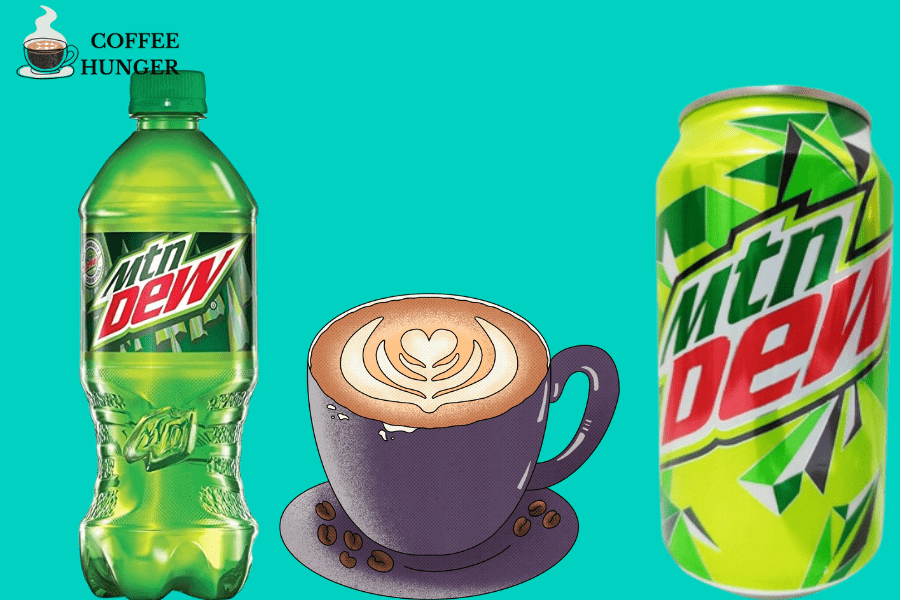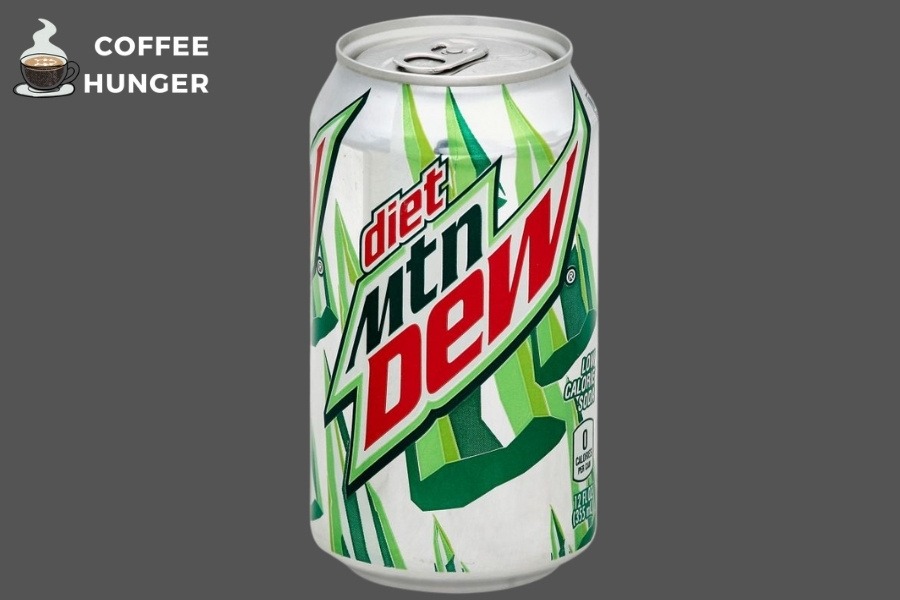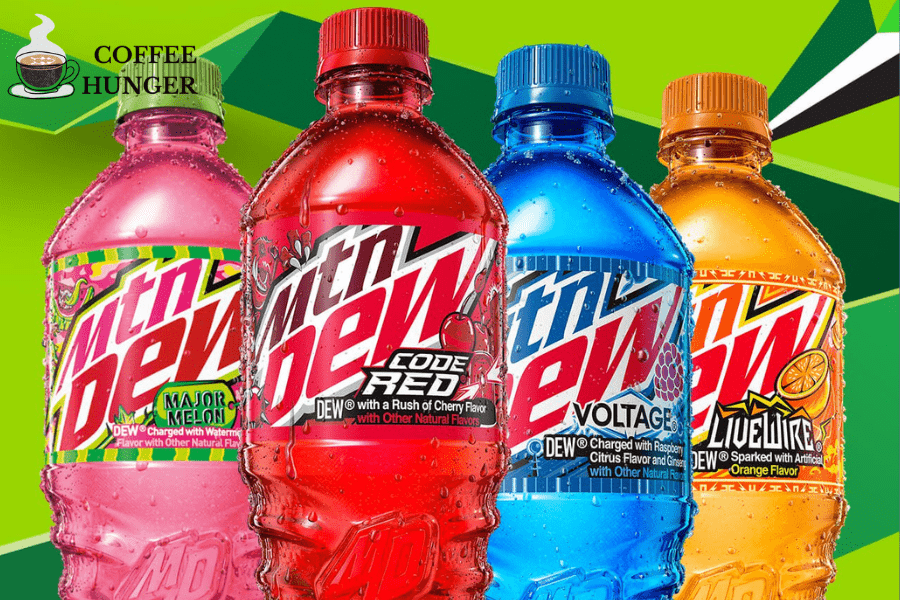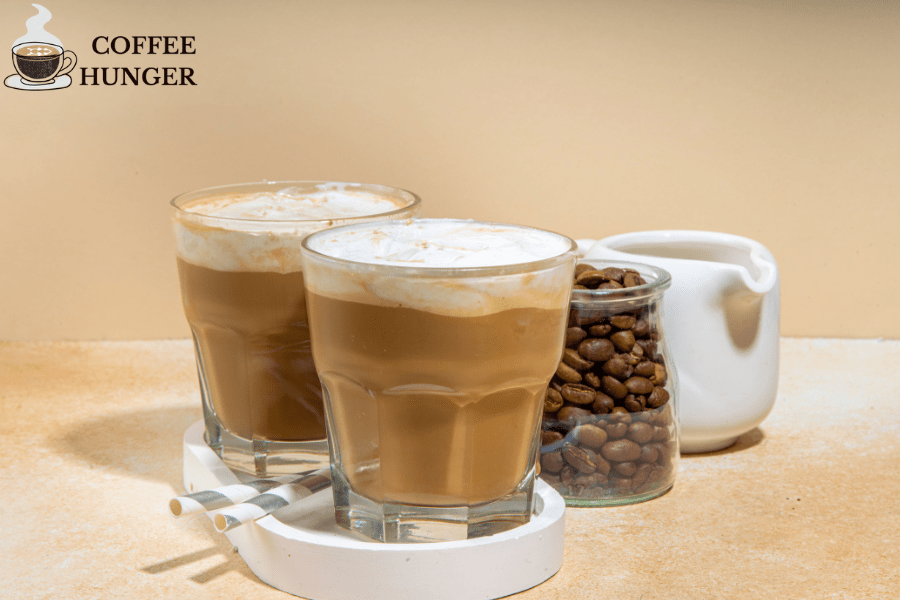How Much Caffeine in Mountain Dew? Well, that is a question we’ve all asked at some point. We know that the sugar content can lead to an increased intake of calories, but just how much Caffeine will it get you? This article will explore the facts and implications of consuming Mountain Dew at different intervals throughout the day.
Do you enjoy a cup of coffee in the evening? Who will drink coffee if they don’t like it or don’t have time to brew it? Are there any other choices? There are, indeed! In actuality, mountain dew is a well-liked substitute.
It is a popular soft drink produced by PepsiCo, also known as Mountain dew, soft drink, or energy drink. The beverage is offered in numerous flavours, serving sizes, and limited editions.
But have you ever wondered how much caffeine in Mountain Dew is there? Coffee, tea, cola, and chocolate are just a few examples of foods and drinks that contain caffeine. It is one of the components that contribute to Coca-distinctively Cola’s delicious flavour.
Everyone wants to hear about these facts because there is so much health consciousness. You might not be aware that Mountain Dew contains a lot of caffeine. Learn how much caffeine in Mountain Dew is, thereby reading on.
What is Caffeine?
Nowadays, billions of individuals depend on caffeine to wake up, get through the night shift, or get through the mid-afternoon slump daily. This natural stimulant is actually among the most commonly used drugs globally. Studies claim that it has many health advantages. However, it has a detrimental impact on anxiety and sleeps too.
How Much Caffeine In Mountain Dew?
Mountain Dew is a popular carbonated drink that many people enjoy. However, some people are concerned about the amount of Caffeine in Mountain Dew. So, how much Caffeine is in Mountain Dew?
A 12-ounce can of Mountain Dew contains 54 milligrams of Caffeine. This is more than the 41 milligrams of Caffeine in a 12-ounce can of Coca-Cola but less than the 71 milligrams of Caffeine in a 12-ounce can of Pepsi.
One thing to keep in mind is that the caffeine content of Mountain Dew can vary depending on the country in it’s made. For example, Mountain Dew made in the UK has less Caffeine than Mountain Dew made in the US.
So, if you’re concerned about the amount of Caffeine in your diet and how much caffeine is in Mountain Dew, then you may want to limit your intake of Mountain Dew. Or, you can opt for a decaffeinated version of the drink.
Is caffeine harmful to you or addictive?
It is well established that moderate caffeine consumption is harmless. Millions of people use caffeine foods and drinks daily, including coffee, tea, and soft drinks. The central nervous system and the brain are stimulated by caffeine. It may result in better mental performance and increased awareness.
We know a lot about caffeine because it has been consumed for centuries. It has been extensively investigated and is known to be safe in the amounts we use in drinks. But not everyone enjoys or desires caffeinated beverages constantly.
Also Read: What Is Frappuccino Roast?
Since caffeine is a mild stimulant, one can experience a few minor side effects if one routinely consumes it and then stop. Blood pressure and heart rate can both be raised by caffeine. It can increase anxiety, irritation, and restlessness when consumed in high doses. Everyday consumption of caffeine-containing beverages like coffee, tea, and soft drinks is popular among people all over the world. But it is best to make the best decision for themselves and their families.
What are the Effects of Caffeine Consumption?
Caffeine is a central nervous system stimulant. It occurs naturally in many plants, including coffee beans, tea leaves, and cocoa beans. When consumed, Caffeine produces several physical and mental effects, such as increased alertness and improved mental focus.
However, excessive caffeine consumption can lead to several side effects, including restlessness, anxiety, irritability, and insomnia. Therefore, it is important to moderate your caffeine intake if you choose to consume caffeine-containing beverages like Mountain Dew.
Does Diet Mountain Dew have Caffeine?
Yes, Diet Mountain Dew does have Caffeine. According to the product website, a 12 oz can of Diet Mountain Dew has 54 mg of Caffeine. Also, Diet Mountain Dew does have sugar. According to the product website, a 12 oz can of Diet Mountain Dew has 39 grams of sugar.
Cons of caffeine
-
Drinks with caffeine frequently have empty calories.
Numerous caffeinated beverages are also high in fat and sugar. Too much soda consumption might deprive essential nutrients like calcium.
-
Caffeinated beverages may harm your teeth.
Tea and coffee consumption can discolour teeth. Many caffeinated beverages include sugar, which can cause cavities.
-
Insomnia may result from caffeine.
Caffeine may make it difficult to get to sleep at night, resulting in insomnia and excessive daytime sleepiness. According to experts, caffeine can make some teenagers tense and, if consumed excessively or too late in the evening, can lead to insomnia.
-
Your head and heart can be affected by caffeine.
Some people’s blood pressure may increase when they consume a lot of caffeine. Excessive drinking might raise blood pressure and heart rate.
It may also result in headaches from withdrawal. According to doctors, a child that consumes excessive amounts of caffeine over time in high doses may become tolerant to it. And naturally, if they attempt to quit, they may experience withdrawal symptoms, such as rebound headaches.
However, if taken in moderation, caffeine has positive effects as well.
Also Raed: What’s The Difference Between A Latte And A Macchiato?
Pros of caffeine
-
Caffeine can boost mental activity and alertness.
Caffeine is a stimulant, and stimulants can aid with focus problems.
-
Small quantities of caffeine can lessen headaches.
Caffeine, in moderation, can help with headaches. Blood vessels widen before a headache, but caffeine’s characteristics stimulate the blood vessels to constrict and restrict blood flow, which can help lessen headache pain. Moreover, caffeine is a component of various headache medications.
-
You can defecate easier with caffeine.
It might encourage the muscles that control bowel movements in your colon to move. According to research, a small amount of caffeine may be able to relieve constipation due to the way it affects the intestinal muscle. Now let’s move on to how much caffeine in mountain dew has.
Mountain Dew and its ingredients
PepsiCo produces and owns Mountain Dew. It was first created by Tennessee beverage bottlers Barney and Ally Hartman in the 1940s, but Bill Bridgforth altered the recipe and came up with a new formula in 1958, which was eventually licensed to the Virginia-based Tip Corporation.
The Tip Corporation’s owner liked the beverage but thought it lacked a certain “oomph.” So, he continued to explore and perfect the recipe, releasing the second iteration of Mountain Dew in 1961, which is very similar to what we have today.
Also Read: The Secret To Pour Over Coffee
Ingredients
Carbonated water, concentrated orange juice, high fructose corn syrup, natural flavours, citric acid, caffeine, and a variety of proprietary flavours and colours make up Mountain Dew’s main ingredients.
Types of Mountain Dew Drinks
Mountain Dew is a soft drink that comes in many different varieties. The original Mountain Dew was created in 1940 and was a non-carbonated mixture of lemon juice, Caffeine, and sugar. Today, many types of Mountain Dew are available, including diet and caffeine-free options.
- Mountain Dew Code Red is a cherry-flavored soft drink that was first introduced in 2001. Code Red contains more Caffeine than the original Mountain Dew, as well as ginseng and taurine.
- Mountain Dew LiveWire is an orange-flavored soft drink that was first introduced in 2004. LiveWire contains more Caffeine than the original Mountain Dew, as well as ginseng and taurine.
- Mountain Dew White Out is a lime-flavored soft drink that was first introduced in 2013. White Out contains less Caffeine than the original Mountain Dew, as well as ginseng and taurine.
- Mountain Dew Diet Code Red is a cherry-flavored soft drink that was first introduced in 2002. Diet Code Red contains no calories, artificial sweeteners, ginseng, and taurine.
- Mountain Dew Diet LiveWire is an orange-flavored soft drink that was first introduced in 2011. Diet LiveWire contains no calories or artificial sweeteners and also contains ginseng and taurine.
- Mountain Dew Red Edition is a cherry-flavored soft drink that has been available since 2007. As America’s leading beverage brand, it is hard to believe that the history of Mountain Dew goes back to just one company.
- Mountain Dew Baja Blast is a tropical blue-green soda flavor exclusively available at Taco Bell restaurants, known for its refreshing and unique taste.
- The very first product called “Mountain Dew” debuted in the mid-1930s by a Tennessee beverage bottling company named Barney & Smith Beverages.
Caffeine and Mountain Dew
Have you ever wondered how much caffeine in mountain dew has while drinking? Along with Coca-Cola and a few other brands, Mountain Dew is among the many caffeinated soft drinks readily available. With a maximum of about 54 mg of caffeine per 12-oz serving, it has one of the highest caffeine contents in the soda sector.
The quantity of caffeine in a typical cup of coffee, which equals roughly 136 mg for a 12-ounce drink, is still far greater. At 63 mg, even black tea contains more caffeine than Mountain Dew.
Also Read: How to Make Latte and How Does it Taste?
Mountain Dew has a lot of sugar, food colours, artificial flavours, and other chemicals that are bad for your health, even though it may contain a lot of caffeine. There are better options and choices for caffeine than Mountain Dew unless you’re in a pinch and it’s the only thing you have. Even merely the excessive sugar content is detrimental to your health for many reasons.
Therefore, sticking to coffee or tea would be better if caffeine is what you’re after. Mountain Dew would not be a bad option, if you need an extra caffeine boost and it’s too late to consume coffee. However, because it contains a lot of calories due to the added sweets and artificial tastes, you should moderate your intake.
Caffeine Content of Other Beverages
Mountain Dew contains more Caffeine than other popular sodas. A 12-ounce can of Mountain Dew has 54 milligrams of Caffeine, a 12-ounce can of Coke has 34 milligrams, and a 12-ounce Pepsi has 38 milligrams. Even though Mountain Dew has more Caffeine, it doesn’t mean it’s more dangerous.
Caffeine is safe in moderation, and most people can consume up to 400 milligrams per day without any adverse effects. So, if you’re looking for a soda with a little extra caffeine kick, Mountain Dew is the way to go.
Caffeine Content in Coffee drinks
It is no secret that Caffeine gives coffee its unique flavor and energizing properties. However, did you know that the caffeine content in coffee can vary widely depending on the type of bean, roasting method, and brewing method used? For instance, a cup of Arabica coffee generally contains about 95mg of Caffeine, while a cup of Robusta coffee can pack upwards of 200mg of Caffeine and cold brew coffee also has a little high amount of Caffeine. Also, Starbucks Pink Drink Actually Have Caffeine content.
So, how much Caffeine is in your favorite Mountain Dew drink? Well, it depends. A 12oz can of Original Mountain Dew contains 54mg of Caffeine, while Diet Mountain Dew has slightly less at 46mg. However, the new Game Fuel® MTN DEW® AMP® GAME FUEL® – CHARGED Cherry Burst flavor contains a whopping 91mg of Caffeine!
Of course, if you’re looking for a real jolt, you can always go for a pure caffeine shot like REIZE Energy Drink. REIZE ships right to your door, and each 8.4oz serving contains only 50mg of Caffeine – perfect for those who are sensitive to the effects of Caffeine but still want to enjoy the benefits of an energy boost.
No matter how you take your coffee, be sure to enjoy it.
Facts about Mountain Dew: should you drink it or not?
-
It can cause heart problems.
One can of Mountain Dew, which has a high sugar content, provides the recommended daily sugar allowance. So it’s ingenious to limit yourself to one can per day (If possible, don’t drink daily). Diabetes and heart problems are brought on by excessive sugar intake.
-
There is no nutritional value in Mountain Dew.
Drinking extreme portions of soft drinks and sugar-sweetened beverages, such as Mountain Dew, should be avoided by people to manage their blood sugar levels and weight, both of which can have an impact on fertility. As you can see, how much caffeine in mountain dew is present, a higher amount of caffeine compared to in common beverages.
-
It doesn’t hurt your stomach but your tooth.
A little additional Mountain Dew acid, swiftly eliminated from the body, shouldn’t hurt your stomach the way it does your teeth for those with healthy digestive systems. Sometimes supporters of Mountain Dew claim that orange juice has the same amount of citric acid as the neon green beverage, if not more.
-
It can harm your teeth.
The worst soda you can consume, though, is Mountain Dew. Dentists claim that this beverage has a startling effect on tooth decay. In actuality, soda can harm your teeth.
-
If consumed daily, it can cause weight gain.
According to research, sugary beverages like Mountain Dew Kickstart are associated with weight gain. Studies have shown that consuming just one soda can daily is sufficient for diabetes. Additionally, Mountain Dew kickstart has empty calories.
-
It can reduce or kill sperm.
Mountain Dew has 54 milligrams (mg) of caffeine in a 12-ounce can, which is more than comparable sodas (Coke has 34 mg per 12 ounces, and Pepsi has 38 mg). So it makes sense that you could believe the caffeine in the drink has the power to reduce sperm. It doesn’t actually kill your sperm, but it is harmful to consume daily.
At last, now you don’t have to search about how much caffeine in mountain dew is there. Your health does not get destroyed by drinking Mountain Dew. This does not suggest that you should consume too much of the beverage, though. You can take it as a fresher.
You don’t have to stop drinking your favourite beverage, but you should limit consumption. Heavy caffeine use might result in restlessness, agitation, upset stomach, diarrhoea, and a quicker heartbeat. So, in the end, the decision is yours.
Conclusion
In conclusion, now you know how much caffeine in mountain dew is there. Mountain Dew is one of the world’s most widely consumed carbonated beverages. Although Mountain Dew is a well-known drink that appears to shine at night, it contains a lot of sugar and other unhealthful chemicals.
Per fluid ounce, Mountain Dew has 4.50 milligrams of caffeine (15.22 mg per 100 ml). A 12 fl oz can have 54 mg of caffeine in total. It includes a lot of caffeine, which can be dangerous and addicting if eaten in considerable amounts.
It does have one of the highest caffeine contents of any beverage, but it’s not at all a reliable source of the drug. Mountain Dew should only be a “once in a while” treat due to its high sugar level, artificial colouring, and flavouring.
It is a good source of caffeine, but the high concentration of sugar and food additives make it unsuitable for daily intake. Although drinking Mountain Dew in moderation is unlikely to be harmful, it’s necessary to be aware of the dangers of excessive caffeine intake because you know how much caffeine in mountain dew contains. Gratitude for reading!
Also Read:
Can You Use Heavy Whipping Cream in Coffee?
What is Swiss Water Process Decaf Coffee?
How to Get Rid of Dizziness After Drinking Coffee



